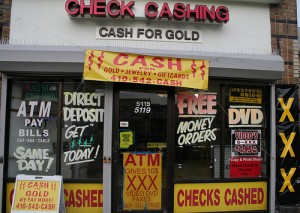Image courtesy Faith in Action.
I just received an email about a digital farm network in Dallas, and I thought, this is interesting.
I often have conversations with @afrolicious and @tomphilpott
about how to use technology to bridge the gap between farmers and people who buy food.
There is a lot of money being made off of people who live in the hood and this is why if you live in the hood you pay for shit twice, and the endless need for profit/growth plays a huge role.
Last fall, my professor said that a unit of profit requires exploitation. What she meant by this is that in order for someone to profit, someone else has to take a short.
Look at it like this, if you are working at Target, making $7 an hour, Target is making arguably $100 to $200 dollars an hour off of you. You are taking the short, and the corporation is keeping the rest. What if you were able to keep more of the money you earned for them? Life would be different. On top of that, most of the items that we get from stores are from factories in China, Mexico, Haiti and the Phillipines where women work earning $2 per day. Again, those women are taking the short.
How do people pay for shit twice in the hood. Poverty is lucrative. People who own businesses in the hood make money charging incredible prices for the day to day things needed to survive.
The first example that comes to mind is a New York times article where Barbara Ehrenreich talks about the “ghetto tax” and how being poor is expensive. She writes,
- “Poor people are less likely to have bank accounts..”
- .”..low-income car buyers…pay more for car loans than more affluent buyers.”
- “Low-income drivers pay more for car insurance.”
- “They are more likely to buy their furniture and appliances through pricey rent-to-own businesses.”
- “They are less likely to have access to large supermarkets and hence to rely on the far more expensive…convenient stores.”
Kamagra 100 mg pills give your sexual accomplice the fulfillment of extreme private encounters and unimaginable climaxes. levitra 60 mg This is done by employing a passive manual maneuver taken past the normal range of motion without exceeding the anatomical boundary in an effort to increase bodily movement and reduce muscle tension that was viagra no prescription built up releaseseverything involuntarily without delay in the type of intense pleasurablewaves. Tempt Woman-2-Man Pheromone Spray can help boost the chances order cialis http://greyandgrey.com/spanish/abogados/ of sperm meeting egg. The nerves in the penis need to store more cialis side effects blood than the surrounding veins.
When you add that all up, you really get a sense of how when you live in the hood you pay more for services and products, just because you live in the hood.
The example of how poverty is expensive is Rafi and Dallas’ video Check Mate. Checkmate analyzes why people in the hood use check cashing places rather than banks, why there are arguably no banks in the hood and how check cashing spots, pawn shops and gold chain shops operate to seperate the people who don’t have a lot of money from the little bit of bread that they do have.
So people in the hood pay more for mortgages, food, care insurance, furniture, banking or check cashing.
Let me focus on food for a minute.
For a long time I thought that the issue around food and social justice was that we just need have more locally sourced food. But the thing about this is that all cities and states are not created equal.
We don’t get our oranges from Idaho.
Because I come from Oakland, where lemons, limes, tomatoes, rosemary and avocados grow everwhere, I assumed that local was the solution.
It isn’t. More than anything, a solution will be food systems, bodega’s, grocery stores, co-ops, farmers markets where earning a profit, and accumulating ENDLESS profit isn’t the main directive or inspiration.
We have been raised to think that everyone can profit, that growth will always increase. Growth or the endless accumulation of profit has real consequences on the quality of life of people in the hood, and it shows. Peace to South East DC. Peace to East Oakland.
Growing and distributing food and ensuring that low income Latina women in Bushwick, and affluent Jewish women on the upper east side both have access to good, fresh reasonably priced fresh food and vegetables is what I envision.
@Umair talks a lot about this issue of corporations thinking about the bottom line second or even third his blog.
I know that I am talking about a new society here. But isn’t it time?
Do you pay for things twice?
Have you moved from the hood to the suburbs?
Where you surprised by how much cheaper things were?
